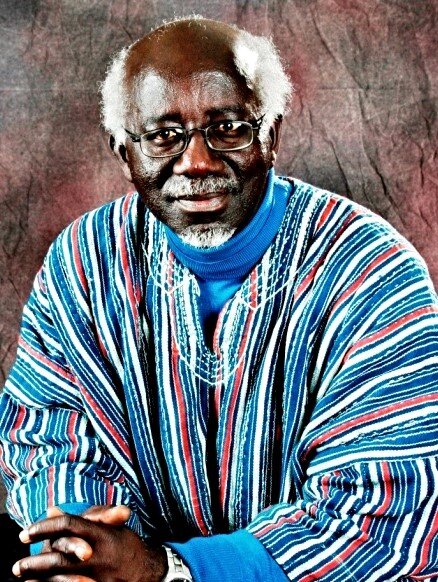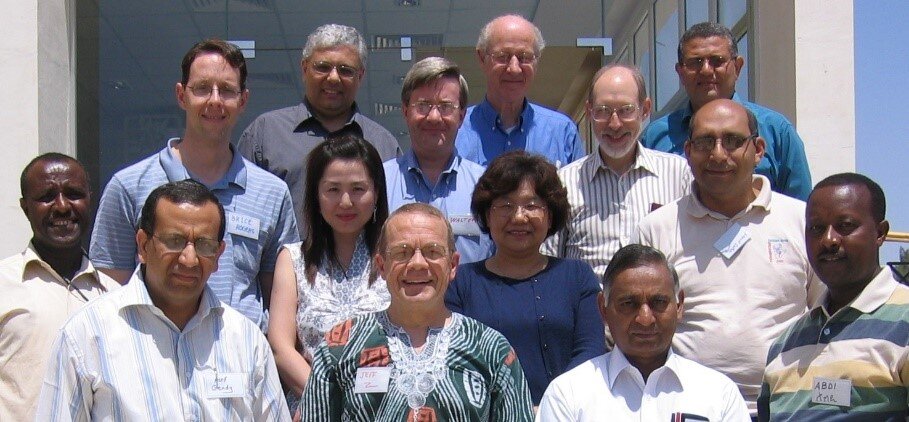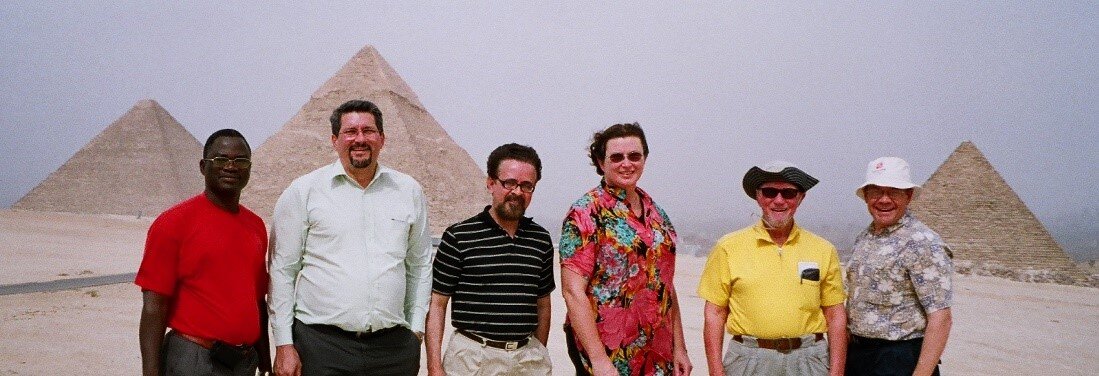The Beginning of the South-South Mission Initiative (Now called Collaborative Mission Initiatives)
INSTALLMENT 12 OF THE HISTORY OF THE OUTREACH FOUNDATION IN EGYPT
by Jeff Ritchie
Prologue - The 2005 Global Mission Conference: A key event for The Outreach Foundation in 2005 has already been alluded to in this history, namely, the global mission conference that we co-sponsored with Presbyterian Frontier Fellowship. Entitled “From Everywhere to Everyone: The New Global Mission,” this conference emphasized that the center of gravity for Christianity around the world had shifted from Europe and North America to the “Global South,” that is, to Latin America, Africa, and Asia. Plenary and workshop speakers from Egypt, Ghana, China, Nepal shared what God was doing in their lands and inspired conference attendees to be part of this “new global mission.”
A plenary speaker from Ghana inspired us in a different way. The Rev. Dr. Kwame Bediako, Rector of the Akrofi-Christaller Institute for Theology, Mission, and Culture, gave an African perspective on the mission of God. As we heard Dr. Bediako, we realized that we were in the presence of a giant in the field of missiology. As a representative of the Church in the Global South, Bediako was calling the Church in the West to pay attention to theology and missiology that was coming from the Church in the Global South.
Next Step - The “Reverse Mission” Experience of 2006: I had known about Kwame Bediako and the mission institute that he founded more than a decade before this conference. Having now heard him in person, I wanted to visit Ghana and spend time with him. I planned an Outreach Foundation trip for people for this purpose, and five persons joined me in March 2006 for a life-changing experience at the Akrofi-Christaller Institute.
For a week we traveled around Ghana visiting churches and seminaries. For the better part of another week, we plunged into the life of the Akrofi-Christaller Institute (ACI). We sat in on lectures, worshiped with the community of scholars at ACI, and shared meals with Dr. Bediako and his colleagues in their homes. It was an overwhelming experience for us as we saw worship, theological reflection, and mission practice integrated into a holistic formation for ministry by laypeople and clergy alike. I termed it a “reverse mission” experience for our group; we were the recipients of the ministry of Ghanaian Christians.
As I reflected on our trip, I realized that we American Christians were privileged to have these kinds of global connections. We could go to Ghana or Egypt, to China or Brazil, and learn from our friends how to be more faithful disciples of Jesus Christ and participants in his mission. Why not share this opportunity and find ways to introduce our friends in these countries to each other?
The South-South Mission Initiative Emerges: In response to this reflection on our experience in Ghana, we developed a new mission initiative of The Outreach Foundation, “Developing South-South Mission Relationships.” (Now called Collaborative Mission Initiatives). The initiative envisioned bringing together mission leaders from the Global South around a common mission challenge. As they shared their experiences and best practices in mission, our hope was that they would develop long-term mission relationships.
A concrete opportunity to initiate the South-South Initiative came less than six months after our trip. Dr. Atef Gendy, President of the Evangelical Theological Seminary in Cairo, began a sabbatical in the US in the summer of 2006. Another global friend of The Outreach Foundation, the Rev. Dr. Maqsood Kamil, Vice-President of the Gujranwala Seminary in Pakistan, was also in the US at the same time. Both had been invited to be resource persons at a Presbyterian mission conference hosted at Peachtree Presbyterian Church in Atlanta, Georgia. The Outreach Foundation was part of the planning of the conference, and we brought Dr. Gendy and Dr. Kamil together to get to know each other. Out of our discussion came the seeds for a South-South mission consultation. Both lived in countries where Muslims were overwhelmingly in the majority. Both faced a common issue: How does our curriculum prepare our students for witness among their Muslim neighbors? They thought that a consultation seeking to answer this question would be a good goal to pursue.
Egypt-Ethiopia-Pakistan: Over eighteen months the project came together. The Church in Egypt hosted the event in the spring of 2008 at the retreat center of the Kasr El Doubara Evangelical Church. Dr. Atef Gendy, Dr. Tharwat Wahba, and Dr. Sherif Salah plus other staff at the Cairo Seminary served as both hosts and participants. Three representatives from Gujranwala Seminary, all of whom were friends of The Outreach Foundation, were invited, but only one of them, the Rev. Dr. Aslam Ziai, received a visa. The planners of this consultation also wanted participants from a seminary in Sub-Saharan Africa, and the Mekane Yesus Theological Seminary, the seminary of the Ethiopian Evangelical Church Mekane Yesus, sent three from its faculty to the consultation. Though not a Muslim-majority nation, Ethiopia had a large enough percentage of Muslims (40%) that the Mekane Yesus Church faced challenges similar to those in Egypt and Pakistan.
In addition to the participants from seminaries in the Global South, we had two international resource persons: Dr. Dudley Woodbery of Fuller Seminary and Dr. Wafik Wahba, an Egyptian teaching at Tyndale University in Canada. Also present were staff and trustees of The Outreach Foundation. Major funding for the event was provided by Outreach Foundation friends in the US, especially the Eastminster Presbyterian Church in Wichita.
The Cairo Seminary planned the structure of the consultation. Each seminary’s representatives were invited to share the religious context of their country, describe the curriculum used to train students in the knowledge of Islam and in witness to Muslims, and bring up points for prayer for their seminary, their church, and their country.
The resource persons helped participants see the larger context of the encounter of Islam and Christianity by sharing case studies of movements to Christ among Muslims and the challenge of training leaders from among these Muslim converts. Worship, fellowship and prayer times were extremely rich parts of the three-day event.
The consultation was a great encouragement to the participants. Faculty from each seminary committed to developing relationships with faculty from the other seminaries. After hearing the reports of the other presenters, the Gujranwala Seminary resolved to develop a Christian-Muslim Relations curriculum. The Cairo Seminary committed itself to develop theological education by extension as a possible means of training converts from among the “majority people.” All the seminaries were challenged by the resource people to explore mentoring as a means of theological formation for Muslims who become Christ-followers.
Egypt, Ghana, Brazil: The Mission Consultation of 2008 was the first South-South Initiative to be considered, but it was not the first one to be carried out. The Outreach Foundation proposed a pilot South-South venture as a part of our 2007 trip to Egypt. We wanted a few of our friends in Brazil and Ghana to experience the bold vision for mission and outreach of our Egyptian friends. So we invited the Rev. Jonas Furtado do Nascimento, from the Independent Presbyterian Church in Brazil, the Rev. Dr. John Azumah, from the Presbyterian Church of Ghana, and Mr. Alcenir Oliveira, a lay leader in a Brazilian Presbyterian Church in the US, to join our 2007 trip to Egypt.
The purpose of that trip, as described in the previous chapter, was to visit the Lay Pastor Initiative which had been launched the previous year. We knew from our mission relationships in Brazil and Ghana that the churches there placed a high priority on lay pastors (variously termed “evangelists,” “missionaries,” or catechists”). The leaders we invited had experience with lay training programs and with mission initiatives in which lay pastors were the point persons for the ministries. Seeing the Egyptian Lay Pastor Initiative at work through Global South “eyes” might be valuable both to our Egyptian friends and to US supporters.
Although the trip’s purpose was only secondarily to develop “South-South” mission relationships, the Egyptian, Brazilian and Ghanaian participants enjoyed the experience to the point that they agreed that they should develop their own South-South process. Dr. Azumah, on behalf of the Presbyterian Church of Ghana, offered to host a consultation in his country in 2008, the theme of which would be how the churches in each country involved lay leaders in the mission of the church. They also agreed that at least two representatives should come from the visiting churches. The story of that consultation - which took place two months before the one in Egypt described earlier - will be told in the history of The Outreach Foundation in Ghana, the next volume in this series.
The importance of the South-South Mission Initiative for The Outreach Foundation is that it was a response by an American mission organization to the reality which had been emphasized throughout the Global Mission Conference of 2005. Namely, God was doing a new thing in mission in the calling and sending of people from every church in the world to every place in the world. With the whole people of God engaged in mission to the whole world, The Outreach Foundation realized that our mission had expanded. Not only were we called to continue our primary mission of connecting US Christians with our global friends; we were also being called to connect our global friends with each other for greater faithfulness in God’s mission.



